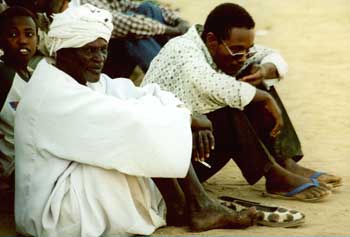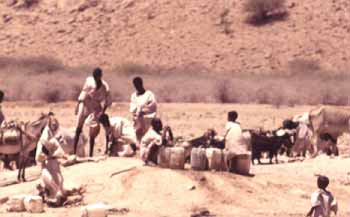

The Nuba Mountain People of Sudan
The Nuba people reside in one of the most remote and inaccessible places in all of Sudan--the foothills of the Nuba Mountains in central Sudan. At one time the area was considered a place of refuge, bringing together people of many different tongues and backgrounds who were fleeing
 oppressive governments and slave traders. As a result, over 100 hundred languages are spoken in the area
and are considered Nuba languages, although many of the Nuba also speak Sudanese Arabic, the official language of Sudan.
oppressive governments and slave traders. As a result, over 100 hundred languages are spoken in the area
and are considered Nuba languages, although many of the Nuba also speak Sudanese Arabic, the official language of Sudan.
The Nuba Mountains mark the southern border of the sands of the desert and the northern limit of good soils washed down by the Nile River. Many Nubas, however, have migrated to the Sudanese capital of Khartoum to escape persecution and the effects of Sudan’s civil war. Most of the rest of the 1,000,000 Nuba people live in villages of between 1,000 and 50,000 inhabitants in areas in and surrounding the Nuba mountains. Nuba villages are often built where valleys run from the hills out on to the surrounding plains, because water is easier to find at such points and wells can be used all year long. There is no political unity among the various Nuba groups who live on the hills. Often the villages do not have chiefs but are instead organized into clans or extended family groups with village authority left in the hands of clan elders.
The Nuba people are primarily farmers, as well as herders who keep cattle, goats, chickens and other domestic animals. They often maintain three different farms: a garden near their house where vegetables needing constant attention, such as onions, peppers and beans, are grown; fields further up the hills where quick growing crops such as red millet can be cultivated without irrigation; and farms farther away, where white millet and other crops are planted.
A distinctive characteristic of the Nubas is their passion for athletic competition, particularly traditional wrestling. The strongest young men of a community compete with athletes from other villages for the chance to promote their personal and their village’s pride and strength. In some villages, older men participate in club- or
 spear-fighting contests. The Nubas’ passion for physical excellence is also displayed through the young men’s vanity—they often spend hours painting their bodies with complex patterns and decorations. This vanity reflects the basic Nuba belief in the power and importance of strength and beauty.
spear-fighting contests. The Nubas’ passion for physical excellence is also displayed through the young men’s vanity—they often spend hours painting their bodies with complex patterns and decorations. This vanity reflects the basic Nuba belief in the power and importance of strength and beauty.
The majority of the Nuba--those living in the east, west and northern parts of the mountains--are Muslims, while those living to the south are either Christians or practice traditional animistic religions. In those areas of the Nuba mountains where Islam has not deeply penetrated, ritual specialists and priests hold as much control as the clan elders, for it is they who are responsible for rain control, keeping the peace, and rituals to insure successful crops. Many are guardians of the shrines where items are kept to insure positive outcomes of the rituals (such as rain stones for the rain magic), and some also undergo spiritual possession.
Because of their unique culture and overall poor job at conformity, both the Muslim and Christian Nubas face the most fierce persecution found in Sudan. On the other hand, those Nuba who are Christians are most likely the strongest believers in Sudan, and the Christian leaders are the boldest to be found in the country. At the same time, however, Nuba Muslims are probably the least accessible people, not only in Sudan but in all of Africa Once they are reached with the Gospel, however, they are very open to receiving and accepting it.
How to pray...
Pray that God will bless Nuba Christians with strength and boldness as they proclaim the Gospel to their friends, neighbors and family members.
Pray that those Nuba who are not Christian will have a deep hunger to know the Truth of Jesus Christ.
Pray that the Nuba people will turn to Christ for comfort and strength as they face persecution from other Sudanese groups.
Ask God to raise up many intercessors who are committed to praying for the Nuba people.
Pray that many people will respond to God's leadership to go and work among the Nuba people.
Pray for an end to Sudan's civil war, which has lasted over a decade and left many people persecuted, starving and homeless.